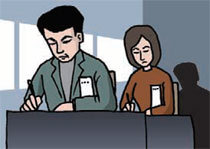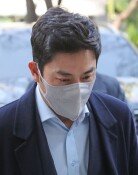Banks revive written tests to assess prospective candidates
Banks revive written tests to assess prospective candidates
Posted May. 15, 2018 07:42,
Updated May. 15, 2018 07:42

“How would you sell a golf club in the subway train?” “How would you move the Seohae Grand Bridge to the Han River?” These were the questions asked in job interviews at most banks in the early 2000s. They have now become classic interview questions but job applicants at that time were perplexed by these questions. These were unusual job interview questions for financial companies as their company cultures were considered quite conservative. From the middle of the 1990s, banks have struggled to find “salesmen,” who can create profit higher than their interest earnings. They abolished their famously difficult written examinations one by one, on the basis that test results did not matter when it comes to sales.
Their “blind recruitment” policy, which was introduced 10 years ago, has generated a lot of talk. The name of the policy has been changed several times but the essence of the policy was removing identification details from the resumes of applicants. This survival strategy of banks was introduced because they found it hard to find the talent they needed just by choosing the ones with a high level of education and English test scores. Banks have slowly moved away from their old practice of favoring law and business majors. Last year, science and engineering majors accounted for 30 percent of 200 people newly employed by Shinhan Bank and 20 perfect of 150 people newly recruited by Woori Bank.
In the first half of this year, Woori Bank revived its written examination in 11 years. In the written examination held on April 28, many questions were asked about expert knowledge in finance, such as trilemma in international finance and types of foreign exchange reserves. Banks are planning to bring back the written tests as a means of overcoming the recruitment scandal that hit the country last year.
Ironically, “blind recruitment” policy, which was considered a symbol of fair society, has become the heart of the corruption in recruitment process. Banks would not want to revive their written tests in order to block any requests asking for a special favor because they know better than anyone that people with high test scores do not necessarily have great job performance. It is regrettable that these tests only increase the burden of job-seekers.







